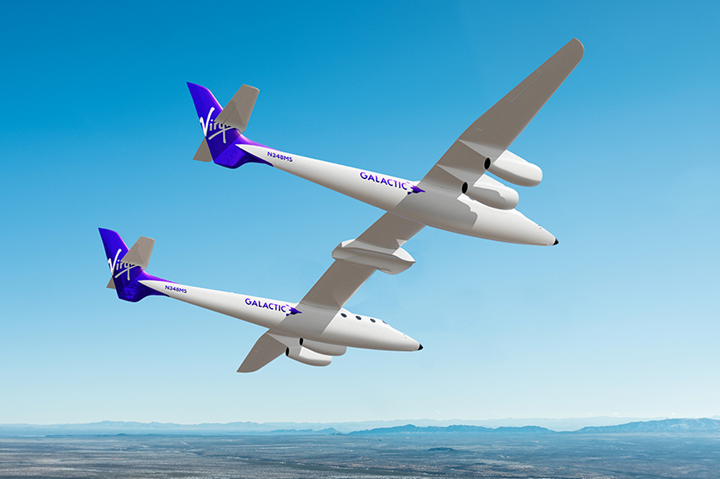Virgin Galactic selects Boeing subsidiary, Aurora, to build new motherships
Agreement with Aurora Flight Sciences to deliver two composite mothership vehicles, each designed to fly up to 200 launches per year, expected to enter service in 2025.
Virgin Galactic (Mojave, Calif., U.S.), an aerospace and space travel company producing the all composite spacecraft, VSS Unity, has announced an agreement with Aurora Flight Sciences (Bridgeport, W.Va.), a Boeing company, to partner in the design and manufacturing of the company’s next-generation motherships. The mothership is the air launch carrier aircraft in Virgin Galactic’s space flight system, that carries the spaceship to its release altitude of approximately 50,000 feet.
Aurora brings more than 30 years of experience building cutting-edge aircraft from concept to delivery and specializes in novel aircraft configurations and complex composites. Virgin Galactic has been working with Aurora for the past several months to develop design specifications as well as workforce and resource requirements in preparation for this long-term project. The two-vehicle contract announced will enable Aurora to immediately begin development.
“Our next-generation motherships are integral to scaling our operations. They will be faster to produce, easier to maintain and will allow us to fly substantially more missions each year,” Michael Colglazier, Virgin Galactic chief executive officer (CEO), says. “Supported by the scale and strength of Boeing, Aurora is the ideal manufacturing partner for us as we build our fleet to support 400 flights per year at Spaceport America.”
Virgin Galactic’s manufacturing strategy is designed to leverage third party suppliers to improve efficiency, access new innovation and technology, and tap into existing highly skilled labor pools. This is said to enable the company’s in-house team to focus on complex and critical elements such as design, engineering and final assembly.
Aurora plans to manufacture the aircraft at its Columbus, Mississippi, and Bridgeport, West Virginia, facilities. Final assembly of the motherships will be completed at the Virgin Galactic facility in Mojave, California.
“Boeing is excited to contribute our culture of safety, our operational excellence and our expertise in aircraft design and manufacturing to help advance human space travel,” Todd Citron, Boeing chief technology officer (CTO) and vice president and general manager of Boeing Research & Technology, adds. “This announcement expands our collaboration with Virgin Galactic to accelerate transformative aerospace technologies.”
The first new mothership is expected to enter service in 2025, the same year Virgin Galactic’s first Delta-class spaceship is expected to begin revenue payload flights. The company’s upcoming commercial missions are expected in Q1 2023.
Related Content
-
The potential for thermoplastic composite nacelles
Collins Aerospace draws on global team, decades of experience to demonstrate large, curved AFP and welded structures for the next generation of aircraft.
-
Plant tour: Spirit AeroSystems, Belfast, Northern Ireland, U.K.
Purpose-built facility employs resin transfer infusion (RTI) and assembly technology to manufacture today’s composite A220 wings, and prepares for future new programs and production ramp-ups.
-
A new era for ceramic matrix composites
CMC is expanding, with new fiber production in Europe, faster processes and higher temperature materials enabling applications for industry, hypersonics and New Space.

















